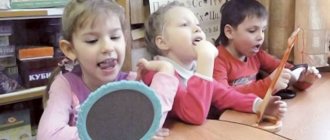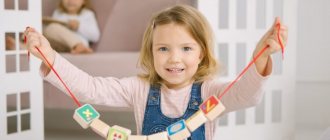- November 21, 2018
- Child psychology
- Artem Minasov
All parents look forward to the moment when their children begin to understand what they are being told. Speech proficiency is the most important task that the baby has to solve. To cope with this, you need to begin to perceive individual words, pronounce them and combine them into phrases. And parents are obliged to help their baby. It’s not easy, but the first cherished words “mom” and “dad” will bring so many emotions.
When children start talking: first attempts
It is almost impossible to say exactly when a child begins to understand what is being said to him. All children begin to develop speech and word recognition at different times. Some begin to speak earlier, others much later; in any case, the baby will not do it right away. First, the child will remember sounds and words and try to perceive them. Later the baby will start to walk. After six months of life, the humming will be replaced by babbling. The child will make attempts to pronounce the simplest syllables - “ma”, “ba”, “da”. And he will begin to understand words. These words are very simple, and they do not have a stressed syllable. As a rule, children try to name the most important things and actions.
For example, if a mother constantly names objects to her child, then he will answer the next question: “Where is the door?” – will turn his head in her direction. The baby will also try to joyfully copy adults in their actions: he will try to drink from a cup, and often has fun when he feels that he is understood.
Booming
The humming occurs around 1-2 months and lasts for about six months. As a rule, these are different variants of sounds: gee-s, agu-u, ge-e, agy-s, etc. Gradually, the baby’s “lexicon” is enriched with new intonations and sounds, the humming becomes meaningful and more active when people appear next to him , with whom you can “chat”.
If you look closely, you will notice that a child aged 3-4 months looks into your eyes while walking, as if trying to build a full-fledged dialogue. He learns to coordinate his voice and gaze, which in the future will become the basis of any contact with people.
Be sure to respond to your child and encourage his first “performances.” Look how he reaches out and tries to purse his tiny lips the way you do in order to give you a decent answer!
Yes, your little speaker is already imitating you and listening to what sounds he makes in order to repeat them most accurately. But for now, what is important for the baby is not the meaning of the words, but the rhythm of speech, the articulation of sounds, and various intonations. He studies all this intensively.
The baby is trying to say: how to behave?
The first time conscious words are heard from a baby is from 8 to 12 months. This is usually the period when the child begins to understand adults. He tries to turn to mom or dad, and sometimes asks for an item. Parents, as a rule, are incredibly happy, believing that their child is finally starting to speak. However, statistics show that speaking words for a long time does not carry any semantic meaning.
At what age does a child begin to understand?
All children are different. You can find many tables that describe what children can do at a given age. However, each child has his own individual parameters. Despite this, parents should definitely study the information on how the child’s age corresponds to his speech development:
- 1–3 months - the child screams, cries loudly, tries to repeat simple sounds - “a-a”, “a-gu”, “a-wu”.
- 4–5 months – the baby laughs, squeals, and makes drawn-out sounds with different intonations and emotions.
- 6 months - the baby recognizes the voices of his parents, tries to babble, makes sounds a little like “ma”, “pa”.
- 7–8 months – the child perceives words and simple requests (give, take). This is exactly the age when a child begins to understand the word “no” and imitates the bark of a dog or the sounds made by other animals. At 8 months, the baby remembers the names of some objects, but still cannot pronounce them.
- 9–11 months - the baby learns to speak simple words - “mom”, “dad”, “na”, “give”. His vocabulary contains no more than 10 words.
- 1–1.5 years – the child knows how to form word combinations, knows what some animals and people look like, and can identify them from illustrations.
- 2–3 years – children understand and learn to ask questions, know different concepts, carry out simple tasks, make sentences, learn and tell fairy tales and poems.
- 3–4 years old - the child already talks not only with mom and dad, but also with relatives and sometimes with unfamiliar children.
According to long-term statistics, the first word of most children is “mama” or “dai.”
Formation of speech function in children 1-2 years of age
By the age of 1, the child begins to understand adult phrases. When the baby hears their speech, he tries to reproduce it. As a rule, this happens unconsciously. The first words are usually the simplest: mom, dad, baba, nanny and others. Next, the child begins to approach his speech meaningfully. For example, if he sees dad, then he will call him “dad.”
Speech development in girls occurs faster than in boys.
This is explained by the fact that the connection between the two hemispheres of the brain is not fully formed, and this slows down the process of information transfer. By 12 months, girls have about 10 words in their vocabulary. Boys achieve this result closer to 14 months. Accordingly, boys begin to speak later. This is the absolute norm.
At 12-14 months, the child begins to consciously pronounce some words. For example, to denote a cat with the word “kitty”, a dog with “woof”. At one and a half years old, the child begins to construct short phrases.
By the age of two, children have about 1,000 words in their vocabulary. They can construct interrogative sentences: “Where is mom?” The baby can also say small phrases: “Let’s go for a walk.”
Becoming Conscious Speech
The pronunciation of these words may not be perfect, but it is recognizable. In addition, the baby speaks in certain situations: the word “mom” is pronounced when she enters or leaves the room. If a baby points, for example, at a cat, saying “kitty,” it is important for parents to confirm that it is a cat, and then check with him where it is. If a child points to an animal, it means that he is beginning to understand. Later, the child will be able to answer certain questions not with a simple hum, but with a specific word.
Even if the child does not speak, this is not yet a reason to panic. Most likely, he will quickly catch up with the norm. After a year of life, the baby rapidly fills its vocabulary. Thus, without yet uttering the name of a certain object, he understands what the adult is talking about. The baby begins to fulfill simple requests, for example, he can bring a ball or a toy, and also often resorts to a pointing gesture, which is accompanied by a demanding intonation. This indicates that a stage is gradually approaching when the child begins to understand what is being said to him.
How to teach a child not only to understand speech, but also to actively use it independently?
Talking and reading help your baby develop good communication patterns. Start reading to him as a baby and you'll give him a boost in language and other skills as he gets older. And although he won't be able to follow the story as he is very young, he will understand that reading is a pleasant and calming way to spend time with you.
By playing with your baby, you help her learn more about how the world works. Use age-appropriate toys and games to stimulate her mental and physical development.
The best way to raise a happy and confident child is to provide him with a safe and loving environment at home. Be kind to him, surround him with care and love, and praise him for good behavior more often (about 4 times) than scold him for bad behavior. You will definitely like the results and so will your child.
Causes of delay in the development of the speech apparatus
Soon the long-awaited moment comes when the child begins to understand speech. Parents are obliged to take part in every possible way in the development of the baby’s speech apparatus, adhering to a simple rule: constantly talk to the baby from the first months, and be sure to pronounce the words correctly. Babysitting will most likely slow down the development of the speech apparatus and is quite capable of causing problems with speech in the future. However, all children learn to speak at different speeds. Most often, girls begin to speak earlier than boys.
Often inexperienced parents try to determine at what age the child begins to understand words and try to pronounce them. If a child does not begin to speak at the age of 2.5 years, then there is a need to consult a specialist. However, you should not go to extremes. There is no need to demand too much from the baby; it is necessary to take into account his development and age. At the same time, it is unacceptable to ignore the existing problem, because developmental delays are easier to correct at the initial stage. Speech delays are quite common and can be due to the following reasons:
- Heredity. Probably, mom or dad started talking at a late age, and the child inherited this feature.
- Problems with hearing or speech apparatus. Most likely, these organs are not developed enough. Only doctors can determine this more precisely.
- Neurological disorders caused by hypoxia during childbirth or illness.
- There is little or no dialogue with the child.
- Active child. He is in a hurry to explore the world, his physical development is higher than his speech.
- Tensions between parents. Children subtly perceive the atmosphere in the family, which affects their development.
The sooner the doctor understands the exact cause of delays in speech development, the faster he will help get rid of them. Treatment will help the child quickly catch up and speak correctly. By the time he goes to school, the baby will not be different from other children.
Mom, don't worry!
Don't worry if your baby, who is not yet a year old, speaks little and is reluctant.
All children are individual and it’s really not worth taking to heart the fact that your friend’s child has been babbling since he was 5 months old, and yours turned out to be silent. It is too early to talk about delayed speech development at this age.
If you follow all the recommendations: communicate with your baby, read aloud, take care of his development, and most importantly, love him, then very soon you will hear from your treasure exactly those words that you are so looking forward to!
Recommendations for parents to help their child start speaking
The time when children begin to understand what they are told depends entirely on the parents and their participation in the child's development. To help your baby begin to pronounce the first phrases, you should follow these recommendations:
- If possible, talk to your child as much as possible, talking through all your actions many times. Listening to his parents speak, he replenishes his vocabulary. You can accompany your daily activities with songs, because children easily perceive such text.
- To begin with, you should resort to short phrases; the baby will not immediately perceive complex sentences.
- The baby's cooing and babbling should be repeated constantly. It is necessary for the child to see the face of the speaker, then he will establish a connection between the source of the sound and the pronunciation.
- You cannot lisp, speech must be clear and correct. But when naming objects, you can resort to two names: full and imitative. For example, “cat”, “kitty-kitty”. In this case, the baby will listen to the word that is easier for him to pronounce, and after the required time has passed, he will move on to the correct form.
- It is useful to read books to children. Of course, you should choose them by age. Nursery rhymes and simple rhymes will do. A one-year-old baby will be interested in looking at the pictures. Later, you should encourage him to name the objects in the pictures. After one and a half years - encourage students to finish lines in poetry.
- You need to pay a lot of attention to fine motor skills. It is closely related to the speech apparatus. Therefore, work with your child: let him sort through the cereal, sculpt and draw with him. All activities that involve hands are suitable; even tearing paper is useful.
By devoting sufficient time to the child, parents will never miss the moment when their miracle utters its first words. And it doesn’t matter how many words a baby says by the age of 1.5 years. The main thing is to take an active part in his development and constantly talk to him.
When does a child begin to understand the word “no”?
It is difficult to say at what specific moment it is necessary to resort to restrictions and prohibitions. This time usually occurs at 9–10 months. Parents need to be prepared for the fact that the word “no” will cause violent protest among children. Nevertheless, one cannot completely abandon prohibitions and restrictions, despite strong love and the desire to please the baby. After all, in the absence of boundaries, it will be difficult for children to adapt to society.
The word “no” sounds quite unpleasant to a child. Therefore, it is advisable to resort to substitute words. Do you want to prevent your baby from touching the hot kettle? Say “hot” and show him what it feels like by leaning his handle against the warm teapot for a moment. Now he will understand the meaning of this word.
A personal example will be more indicative for the child. After all, if the parents themselves adhere to the rules that they have established, then the baby, watching them, will copy their behavior.










